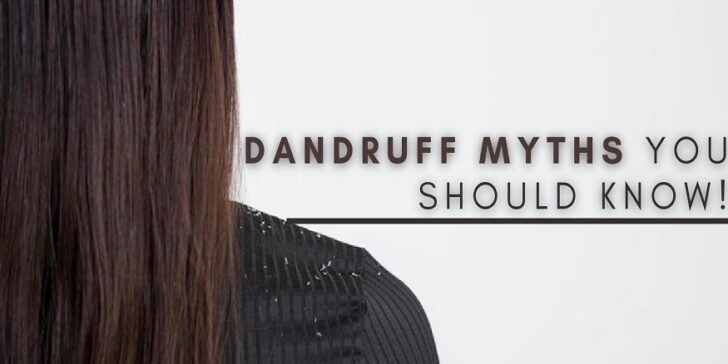
Dandruff is a natural occurrence that affects almost half of all adults in the world. However, people are often hesitant to talk about it freely, which can contribute to misconceptions and myths about the issue. These can be detrimental, as people might choose treatments that end up making the condition worse.
What are some popular myths about dandruff?
- Dandruff is contagious – While flaking and an irritated scalp may seem unbecoming, dandruff isn’t contagious. The cause of dandruff is a naturally found fungus, Malassezia Globosa, that feeds on excessive oil build-up on your scalp to create oleic acid. You develop dandruff only if your body is sensitive to this, not otherwise. ‘Is dandruff contagious’ would imply that you can pass this onto people. But you can’t ‘catch’ dandruff from anyone like you can with lice.
- Dandruff causes hair loss – Perhaps one of the most widely spread dandruff myths is that dandruff causes hair loss. While thereis some association, dandruff does not cause hair loss. A common symptom of dandruff is itching, in addition to flaking and redness. Excessive and prolonged scratching can cause damage to the scalp and the hair follicles, thereby leading to an increase in hair fall. If you don’t scratch, you might not see any hair fall. Factors such as age, stress, and medical conditions can contribute to hair loss, but dandruff is not one of them.
- Dandruff is hereditary – Your eye colour and blood type have a generational component. But is dandruff hereditary? Well, you can’t really inherit dandruff but you can inherit the factors around it. Sensitivity to oleic acidand an overactive oil gland can be inherited. However, even then it doesn’t imply that you will develop dandruff. Just as how generations of healthy, dandruff-free scalps do not guarantee you the same fate.
- Dandruff and dry scalp are the same–People often consider hair dandruff to be a consequence of a dry scalp, lathering on oils as a means to counter this dryness. However, this can end up making your dandruff condition even worse, as dandruff is triggered by the fungus and excessive oiliness. Flaking of dead skin cells is a symptom common to both ailments, but there is a difference in the size of the flakes and the amount of greasiness on your scalp. It might be hard to distinguish between the two, but it’s important to dodge these dandruff myths when searching for remedies.
- Diet and lifestyle do not affect dandruff – The fact is that everything in your environment, lifestyle, and diet can impact the health of your scalp and hair. Refined carbs, complex sugar foods, and even dairy products can increase the oil production on your scalp. You need a diet with healthy fatty acids, vitamins and minerals to control your dandruff condition. Similarly, stresscan cause fluctuations in your hormones and lead to a spike in oil levels.
If you’re wondering how to cure dandruff permanently, there is no one-size-fits-all answer. Different people respond in different ways to specific treatments.Try products like the Head and Shoulders Cool Menthol, which can fight dandruff causing germs and provide you with scalp hygiene. You might even want to visit a dermatologist to get medicated products. However, the first step in seeking effective treatment is to overcomethe myths about dandruff.
